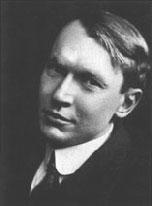
Richard A. Posner
Born: 1939 in New York City, New York
Pen Name: None Connection to Illinois: Posner is a judge on the 7th Circuit Court of Appeals in Chicago. Biography: In 1969, Posner moved to the faculty of the University of Chicago Law School. He was a founding editor of the Journal of Legal Studies and is currently a Senior Lecturer.In 1981, Posner was nominated by President Ronald Reagan to a seat on the United States Court of Appeals for the Seventh Circuit. Posner was confirmed by the United States Senate and received his commission in the same year. He served as Chief Judge of that court from 1993 to 2000 while remaining a part-time professor at the University of Chicago.
Awards:
Selected Titles
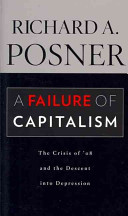 |
A failure of capitalism : ISBN: 0674060393 OCLC: 299711513 Harvard University Press, Cambridge, Mass. : 2009. From the Publisher: The financial and economic crisis that began in 2008 is the most alarming of our lifetime because of the warp-speed at which it is occurring. How could it have happened, especially after all that we've learned from the Great Depression? Why wasn't it anticipated so that remedial steps could be taken to avoid or mitigate it? What can be done to reverse a slide into a full-blown depression? Why have the responses to date of the government and the economics profession been so lackluster? Richard Posner presents a concise and non-technical examination of this mother of all financial disasters and of the, as yet, stumbling efforts to cope with it. No previous acquaintance on the part of the reader with macroeconomics or the theory of finance is presupposed. This is a book for intelligent generalists that will interest specialists as well. Among the facts and causes Posner identifies are: excess savings flowing in from Asia and the reckless lowering of interest rates by the Federal Reserve Board; the relation between executive compensation, short-term profit goals, and risky lending; the housing bubble fueled by low interest rates, aggressive mortgage marketing, and loose regulations; the low savings rate of American people; and the highly leveraged balance sheets of large financial institutions. Posner analyzes the two basic remedial approaches to the crisis, which correspond to the two theories of the cause of the Great Depression: the monetarist-that the Federal Reserve Board allowed the money supply to shrink, thus failing to prevent a disastrous deflation-and the Keynesian-that the depression was the product of a credit binge in the 1920's, a stock-market crash, and the ensuing downward spiral in economic activity. Posner concludes that the pendulum swung too far and that our financial markets need to be more heavily regulated. |
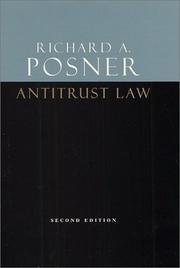 |
Antitrust law / ISBN: 0226675769 OCLC: 46703148 University of Chicago Press, Chicago : ©2001. "When first published a quarter of a century ago, Richard Posner's exposition and defense of an economic approach to antitrust law challenged prevailing conceptions of antitrust policy. Since then, and in part as a result of the influence of the first edition, the antitrust field has been largely (although not completely) transformed into a body of economically rational principles consistent with the ideas set forth in the book. Today's antitrust professionals disagree on specific practices and rules, but most litigators, prosecutors, judges, and scholars agree that the primary goal of antitrust laws should be to promote economic welfare, and that economic theory should be used to determine how well business practices conform to that goal." "In this extensively revised edition, Posner explains the economic approach to new generations of lawyers and students. He updates and amplifies his approach as it applies to the developments, both legal and economic, in the antitrust field since 1976. The "new economy," for example, has presented a host of difficult antitrust questions, and a new chapter explains how the economic approach can be applied to it."--Jacket. |
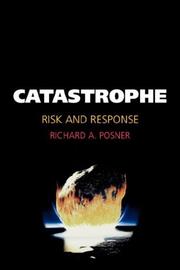 |
Catastrophe : ISBN: 0195306473 OCLC: 55067277 Oxford University Press, Oxford ; 2004. Posner considers how we can better prepare for the chance of an event - such as voraciously self-replicating nanomachines, a world-ending accident in a high-energy partical accelerator or an asteroid collision - so catastrophic that we find it hard to conceive of the consequences. |
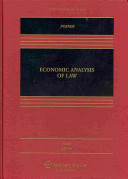 |
Economic analysis of law ISBN: 9781454833888 OCLC: 863695610 Economic Analysis of Law, 9th Edition, written by the pioneer in law and economics analysis, Richard A. Posner, remains the classic text in its field. Lucid, comprehensive, and definitive in its field, this text covers every aspect of economic analysis of the law.-- |
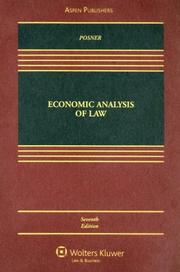 |
Economic analysis of law / ISBN: 0735563543 OCLC: 71812844 Wolters Kluwer for Aspen Publishers, Austin, Tex. : ©2007. This comprehensive text covers every aspect of economic analysis of the law, from common law to the Constitution. |
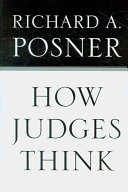 |
How judges think / ISBN: 0674048067 OCLC: 456170013 "A unique and, to orthodox legal thinkers, a startling perspective on how judges and justices decide cases."--Back cover. |
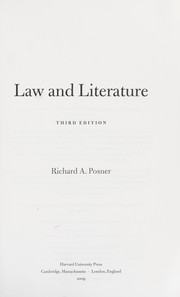 |
Law and literature / ISBN: 0674032462 OCLC: 654448775 Harvard University Press, Cambridge, Mass. : ©2009. |
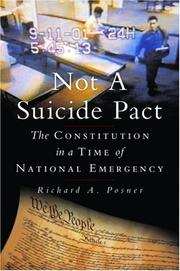 |
Not a suicide pact : ISBN: 0195304276 OCLC: 79612391 Oxford University Press, Oxford ; 2006. Publisher description for Not a suicide pact : the constitution in a time of national emergency / by Richard A. Posner. Eavesdropping on the phone calls of U.S. citizens; demands by the FBI for records of library borrowings; establishment of military tribunals to try suspected terrorists, including U.S. citizens--many of the measures taken by the Bush administration since 9/11 have sparked heated protests. In Not a Suicide Pact, Judge Richard A. Posner offers a cogent and elegant response to these protests, arguing that personal liberty must be balanced with public safety in the face of grave national danger. Critical of civil libertarians who balk at any curtailment of their rights, even in the face of an unprecedented terrorist threat in an era of proliferation of weapons of mass destruction, Posner takes a fresh look at the most important constitutional issues that have arisen since 9/11. These issues include the constitutional rights of terrorist suspects (whether American citizens or not) to habeas corpus and due process, and their rights against brutal interrogation (including torture) and searches based on less than probable cause. Posner argues that terrorist activity is sui generis--it is neither "war" nor "crime"--And it demands a tailored response, one that gives terror suspects fewer constitutional rights than persons suspected of ordinary criminal activity. Constitutional law must remain fluid, protean, and responsive to the pressure of contemporary events. Posner stresses the limits of law in regulating national security measures and underscores the paradoxical need to recognize a category of government conduct that is at once illegal and morally obligatory. One of America's top legal thinkers, Posner does not pull punches. He offers readers a short, sharp book with a strong point of view that is certain to generate much debate. OXFORD'S NEW INALIENABLE RIGHTS SERIES This is inaugural volume in Oxford's new fourteen-book Inalienable Rights Series. Each book will be a short, analytically sharp exploration of a particular right--to bear arms, to religious freedom, to free speech--clarifying the issues swirling around these rights and challenging us to rethink our most cherished freedoms. |
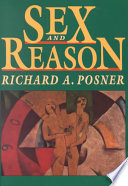 |
Sex and reason / ISBN: 0674802802 OCLC: 441330563 Harvard University Press, Cambridge, Mass. : 1992. How much of a say do we have in our own sexuality? More than is commonly assumed, Richard Posner asserts in this intellectually sweeping and compulsively readable account of sexuality and its social control. While acknowledging that sexual drives and orientations are formed in a fundamentally biological matrix, Posner contends that they are also subject to self-interested choice constrained by perceived costs and benefits. With this approach, he explores numerous puzzles presented by sexual history. Why, for instance, are "macho" cultures generally more tolerant of sexual deviance than their otherwise more sexually liberal Anglo-Saxon counterparts? Why were women in Victorian England less free sexually than women a century earlier? Why might the AIDS epidemic have reduced the ratio of illegitimate to legitimate births? Why is marital rape increasingly criminalized? Economics provides Sex and Reason with its unifying perspective, but Posner also draws heavily on biology, law, psychology, anthropology, history, philosophy, sociology, theology, and women's studies. The scope of his analysis is broad, ranging from ancient Greece to modern Sweden, from African tribal societies to the American Catholic priesthood, from Islamic sexual regulation to the sexual jurisprudence of the U.S. Supreme Court, from polygamy and homosexuality to abortion, surrogate motherhood, and pornography. In all these areas, Posner argues, the rational choice approach can illuminate temporal and cultural variance in sexual norms and practices and point the way to enlightened reform. A widely respected judge and legal scholar, Posner seeks to dispel the clouds of ignorance, prejudice, shame, and hypocrisy that befog the public discussion of sex. His effort is especially timely, coming as it does at a juncture when the American legal system is strained to its limits by such phenomena as the AIDS epidemic, the abortion controversy, the homosexual rights movement, battles over the federal funding of erotic art, and growing attention to sexual harassment and abuse. Lucid, informative, eclectic, and nontechnical, Sex and Reason offers a fresh approach to issues that fascinate, perplex, and ultimately shape society in its most private moments and public gestures. |
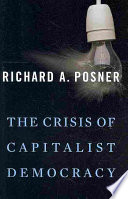 |
The crisis of capitalist democracy / ISBN: 0674055748 OCLC: 456169918 Harvard University Press, Cambridge, Mass. : 2010. "Following up on his timely and well-received book, A Failure of Capitalism, Richard Posner steps back to take a longer view of the continuing crisis of democratic capitalism as the American and world economies crawl gradually back from the depths to which they had fallen in the autumn of 2008 and the winter of 2009. By means of a lucid narrative of the crisis and a series of analytical chapters pinpointing critical issues of economic collapse and gradual recovery, Posner helps non-technical readers understand business-cycle and financial economics, and financial and governmental institutions, practices, and transactions, while maintaining a neutrality impossible for persons professionally committed to one theory or another. He calls for fresh thinking about the business cycle that would build on the original ideas of Keynes. Central to these ideas is that of uncertainty as opposed to risk. Risk can be quantified and measured. Uncertainty cannot, and in this lies the inherent instability of a capitalist economy. As we emerge from the financial earthquake, a deficit aftershock rumbles. It is in reference to that potential aftershock, as well as to the government's stumbling efforts at financial regulatory reform, that Posner raises the question of the adequacy of our democratic institutions to the economic challenges heightened by the greatest economic crisis since the Great Depression. The crisis and the government's energetic response to it have enormously increased the national debt at the same time that structural defects in the American political system may make it impossible to pay down the debt by any means other than inflation or devaluation."--Jacket. |
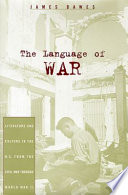 |
The language of war : ISBN: 9780674030268 OCLC: 456250326 Harvard University Press, Cambridge, Mass. : 2002. The Language of War examines the relationship between language and violence, focusing on American literature from the Civil War, World War I, and World War II. James Dawes proceeds by developing two primary questions: How does the strategic violence of war affect literary, legal, and philosophical representations? And, in turn, how do such representations affect the reception and initiation of violence itself? Authors and texts of central importance in this far-reaching study range from Louisa May Alcott and William James to William Faulkner, the Geneva Conventions, and contemporary American organizational sociology and language theory.--Jacket. |
 |
Uncommon sense : ISBN: 9780226041025 OCLC: 688516792 The University of Chicago Press, Chicago ; 2010. The Becker-Posner Blog, founded by Nobel Prize-winning economist Gary S. Becker and renowned jurist and legal scholar Richard A. Posner, banks its reputation on lively, thought-provoking commentary on current events, along with pithy and profound weekly essays highlighting the value of economic reasoning when applied to unexpected topics. Uncommon Sense gathers the most important and innovative entries from the blog, arranged by topic, along with updates and even reconsiderations when subsequent events have shed new light on a question. Whether it's Posner making the economic case for the legalization of gay marriage, Becker arguing in favor of the sale of human organs for transplant, or even the pair of scholars vigorously disagreeing about the utility of collective punishment, the writing is always clear, the interplay energetic, and the resulting discussion deeply informed and intellectually substantial. |


